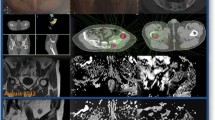Summary
Very strict entry criteria are employed by the EORTC Genito-Urinary Group in phase II chemotherapy studies in metastatic prostate cancer. In order to objectively define response, only bi-dimensionally measurable soft tissue and visceral lesions are accepted. There is a paucity of such lesions. The primary lesion, measured by rectal ultrasound, was used as an indicator lesion in patients with bone metastases in two consecutive single-agent studies in an attempt to increase recruitment. This patient population was shown to have different characteristics than the patients with measurable metastatic indicator lesions in both studies. Besides differences in the proportions in the response categories, other differences between the two groups were evident. Consequently the primary lesion will no longer be used to assess response in future studies.
Similar content being viewed by others
References
Citrin DL, Elson P, DeWys WD (1984) Treatment of metastatic prostate cancer — An analysis of response criteria in patients with measurable soft tissue disease. Cancer 54:13–17
Einhorn LH (1983) An overview of chemotherapy trials in advanced cancer of the prostate. In: Skinner DG (ed) Urological Cancer. Grune and Stratton, New York, pp 89–100
Eisenberger MA, Simon R, O'Dwyer PJ, Wittes RE, Friedman MA (1985) A re-evaluation of non-hormonal cytotoxic chemotherapy in the treatment of prostatic carcinoma. J Clin Oncol 3:827–841
Johnson DE, von Eschenbach AC (1980) Prostatic carcinoma: A trilogy of clinical expressions. South Med J 73:1304–1307
Jones WG, Fosså SD, Denis L, Coninx P, Glashan RW, Akdas A, De Pauw M (1983) An EORTC phase II study of vindesine in advanced prostate cancer. Eur J Cancer Clin Oncol 19:583–588
Jones WG (1985) EORTC phase II chemotherapy studies in prostate cancer. In: Schroeder FH, Richards B (eds) Therapeutic Principles in Metastatic Prostatic Cancer (EORTC Genito-Urinary Group Monograph 2, part A). Alan R Liss, New York, pp 435–445
Jones WG, Fosså SD, Bono AV, Croles JJ, Stoter G, De Pauw M, Sylvester R (1986) Mitomycin-C in the treatment of metastatic prostate cancer: report of an EORTC phase II study. World J Urol 4:182–185
Paulson DF, Berry WR, Cox EB, Walker A, Laszlo J (1979) Treatment of metastatic endocrine unresponsive carcinoma of the prostate gland with multi-agent chemotherapy: Indicators of response to therapy. J Natl Cancer Inst 63:615–622
Slack NH, Brady MF, Murphy GP (1984) A re-examination of the stable category for evaluating response in patients with advanced prostate cancer. Cancer 54:564–574
Smith PH (1981) Endocrine and cytotoxic therapy. In: Duncan W (ed) Recent Results in Cancer Research: Prostate Cancer, vol 78. Springer Berlin Heidelberg New York, pp 154–172
Tannock IF (1985) Is there evidence that chemotherapy is of benefit to patients with carcinoma of the prostate? J Clin Oncol 3:1013–1021
WHO Handbook for Reporting Results of Cancer Treatment (1979) World Health Organisation, Offset Publication No 48, Geneva
Yagoda A (1983) Cytotoxic agents in prostate cancer: An enigma. Semin Urol 1:311–321
Author information
Authors and Affiliations
Consortia
Additional information
Other members of the EORTC Genito-Urinary Group contributing to this study were: F. Calais da Silva, Lisbon, Portugal; L. Denis and F. Keuppens, Brussels, Belgium; M. Pavone-Macaluso, Palermo, Italy; G. Stoter, Amsterdam, The Netherlands
Rights and permissions
About this article
Cite this article
Jones, W.G., Bono, A.V., Verbaeys, A. et al. Can the primary tumour be used as the sole parameter for response in phase II chemotherapy studies in metastatic prostate cancer? An EORTC Genito-Urinary Group Report. World J Urol 4, 176–181 (1986). https://doi.org/10.1007/BF00327016
Issue Date:
DOI: https://doi.org/10.1007/BF00327016




